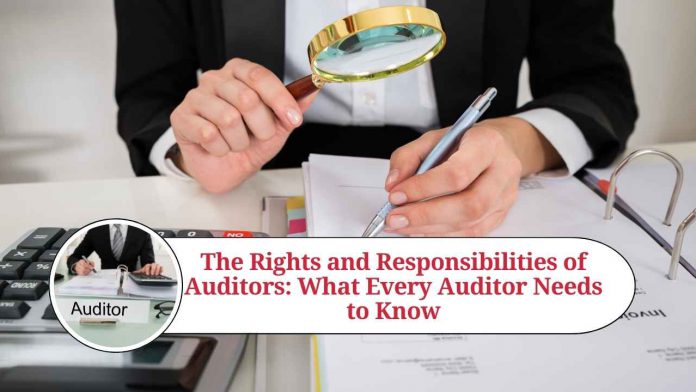Rights and Duties of an Auditor
An auditor is a professional who is appointed to examine the financial statements of a company and provide an opinion on whether they are accurate and reliable. Auditors have both rights and duties, which are essential to ensure the integrity of financial reporting. In this blog, we will discuss the rights and duties of an auditor in detail.
Rights of an Auditor
- Right to access information: Auditors have the right to access all the books, records, and documents of the company they are auditing. This includes financial statements, bank statements, invoices, contracts, and other important documents that are necessary to carry out an audit.
- Right to obtain explanations: Auditors have the right to obtain explanations from the company’s management and employees regarding any transactions, accounts, or activities that are relevant to the audit. The management is required to provide all the necessary information and assistance to the auditor to carry out the audit effectively.
- Right to communicate with stakeholders: Auditors have the right to communicate with the company’s stakeholders, including shareholders, board of directors, and management, to obtain information relevant to the audit. This communication helps auditors to understand the business operations and identify any risks or issues that may affect the financial statements.
- Right to request additional information: Auditors have the right to request additional information from the company if they believe that the information provided is insufficient or incomplete. This may include further documentation, clarification on transactions, or additional testing to verify the accuracy of the financial statements.
Duties of an Auditor
- Duty to maintain independence: Auditors have a duty to maintain independence and objectivity throughout the audit process. This means that auditors should not have any financial or personal interest in the company they are auditing, and should not be influenced by any external factors that may compromise their independence.
- Duty to exercise due care: Auditors have a duty to exercise due care and professional skepticism in carrying out the audit. This includes conducting appropriate tests, gathering sufficient evidence, and evaluating the information obtained to form an opinion on the financial statements.
- Duty to report findings: Auditors have a duty to report their findings to the company’s stakeholders in the form of an audit report. The report should provide an opinion on the financial statements and highlight any issues or risks that were identified during the audit.
- Duty to maintain confidentiality: Auditors have a duty to maintain the confidentiality of all information obtained during the audit process. This includes financial information, personal information of employees or customers, and any other sensitive information that may be obtained during the audit.
Auditing is a critical function that helps to ensure the accuracy and reliability of financial reporting. An auditor is a professional who is trained to perform this function, and their role is to provide an independent assessment of the financial statements of an organization. Auditors are required to have a thorough understanding of accounting and auditing standards, as well as an in-depth knowledge of the industry they are auditing.
Rights of an Auditor
- Right to access information: The right to access information is one of the most important rights of an auditor. The auditor needs access to all the books, records, and documents of the company they are auditing to carry out their work effectively. The auditor should have the right to access any information that they need to perform their duties.
- Right to obtain explanations: The auditor has the right to obtain explanations from the company’s management and employees regarding any transactions, accounts, or activities that are relevant to the audit. The management is required to provide all the necessary information and assistance to the auditor to carry out the audit effectively.
- Right to communicate with stakeholders: The auditor has the right to communicate with the company’s stakeholders, including shareholders, board of directors, and management, to obtain information relevant to the audit. This communication helps auditors to understand the business operations and identify any risks or issues that may affect the financial statements.
- Right to request additional information: The auditor has the right to request additional information from the company if they believe that the information provided is insufficient or incomplete. This may include further documentation, clarification on transactions, or additional testing to verify the accuracy of the financial statements.
Duties of an Auditor
- Duty to maintain independence: One of the key duties of an auditor is to maintain independence and objectivity throughout the audit process. Independence is critical because it ensures that the auditor’s opinion is unbiased and objective. The auditor should not have any financial or personal interest in the company they are auditing, and should not be influenced by any external factors that may compromise their independence.
- Duty to exercise due care: The auditor has a duty to exercise due care and professional skepticism in carrying out the audit. This means that they need to be diligent and thorough in their work, and they should question any information that does not appear to be accurate or complete. The auditor should also consider the risk of fraud and assess the adequacy of internal controls.
- Duty to report findings: The auditor has a duty to report their findings to the company’s stakeholders in the form of an audit report. The report should provide an opinion on the financial statements and highlight any issues or risks that were identified during the audit. The auditor should also provide recommendations for improvement, if necessary.
- Duty to maintain confidentiality: The auditor has a duty to maintain the confidentiality of all information obtained during the audit process. This includes financial information, personal information of employees or customers, and any other sensitive information that may be obtained during the audit. The auditor should only share information with those who have a legitimate need to know.
Conclusion
In conclusion, the rights and duties of an auditor are essential to ensure the integrity of financial reporting. Auditors have the right to access information, obtain explanations, communicate with stakeholders, and request additional information. They also have a duty to maintain independence, exercise due care, report findings, and maintain confidentiality. These rights and duties help to ensure that the financial statements are accurate and reliable, which is crucial for the success of any business. The role of an auditor is critical, and they play a vital role in maintaining the trust and confidence of investors, creditors, and other stakeholders in the financial reporting process.
Read more useful content:
Frequently Asked Questions (FAQs)
What is the role of an auditor?
An auditor is responsible for providing an independent assessment of the financial statements of an organization to ensure accuracy and reliability.
What qualifications do I need to become an auditor?
To become an auditor, you typically need a degree in accounting, finance, or a related field, and a professional certification such as Certified Public Accountant (CPA) or Certified Internal Auditor (CIA).
What is the difference between internal and external auditors?
Internal auditors work within an organization to assess its internal controls and provide recommendations for improvement, while external auditors are independent professionals who assess the financial statements of an organization.
Why are audits important?
Audits are important because they help to ensure the accuracy and reliability of financial reporting, which is crucial for the success of any business.
What is a financial statement audit?
A financial statement audit is an independent assessment of an organization’s financial statements to ensure they are accurate and reliable.
How long does an audit take?
The length of an audit depends on the size and complexity of the organization being audited. It can take anywhere from a few weeks to several months.
What are the types of audit opinions?
The types of audit opinions include unqualified opinion, qualified opinion, adverse opinion, and disclaimer of opinion.
What is the difference between an audit and a review?
A review is a less comprehensive assessment of an organization’s financial statements compared to an audit, and provides limited assurance on the accuracy and reliability of the statements.
Who hires auditors?
Auditors are typically hired by the organization being audited, either internally or externally. However, external auditors may also be hired by regulatory bodies or other stakeholders.
What happens if an auditor uncovers fraud during an audit?
If an auditor uncovers fraud during an audit, they are required to report it to the appropriate authorities and may also be required to disclose it in the audit report. The organization may also be subject to legal action and penalties.




















